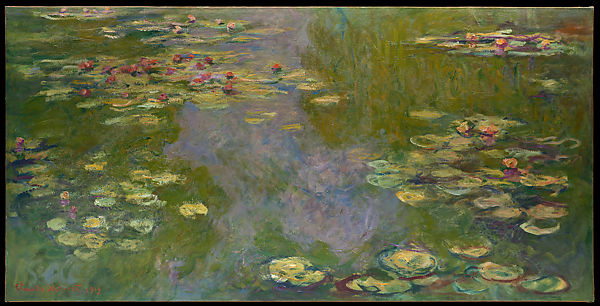Michel Bussi’s detective novel Black Water Lilies is such an ingenious tale that even labeling it would give away too much. Is it psychological fiction? A police procedural? Historical fiction? A study of art history? A suspense story? Or some other genre?
 |
| Monet's Water Lily paintings are mentioned often. |
Black Water Lilies takes place in Giverny, in the immediate vicinity of Monet’s famous water lily gardens, where tourists overwhelm the local scene because they are so numerous. The town also has a history of hosting other artists who were attracted by Monet’s powerful presence. However, the characters in the novel are all local: the rich doctor who is the murder victim found right at the beginning, a child who wants to paint her own water lilies, the local schoolteacher whose husband is a suspect, a very old woman who tells the story, the local police who investigate the crime, some art experts in neighboring towns where there are museums dedicated to the Impressionists, and various other characters. Everyone, in one way or another, is obsessed or becomes obsessed with Monet and his garden.
From the start of the book, the elderly narrator gives clues, but I never guessed what she meant:
“I know it may seem strange to you, two funerals happening in the same cemetery, and not that far apart. Does the coincidence seem disturbing to you? A bit too much? Be sure of one thing, then, and one alone: nothing is a coincidence in this scenario. Nothing is left to chance—quite the contrary. Each element is in its proper place, at exactly the right moment. Each piece in this criminal chain of events has been cleverly arranged, and believe me, I swear on my husband’s grave, nothing’s going to put a stop to it.” (p. 69)
That’s all I’m going to say about the plot and the murders in the novel. It’s too weird. I’ll just illustrate the weirdness with one passage including a very strange word, fugicarnophile, which the author seems to have invented. It’s a conversation between two police detectives:
“There must be several thousand fugicarnophiles in the world…”
Laurenç Sérénac bends down and rubs his knee. “Fugi-whatsit means ‘collector of barbecues,’ I suppose?”
“Well, I’m not absolutely sure it’s in the dictionary. I’m just an amateur, but there’s a man in Argentina who has almost three hundred barbecues from a hundred and forty-three different countries, the oldest of which dates back to twelve hundred years BC.”
Sérénac is rubbing his painful elbows. “Are you pulling my leg?”
“You’re getting to know me, Chief; do you think I’d make up something like that? You know, everywhere in the world, since fire was discovered, men have eaten cooked meat. There is no practice more universal, or that provides a greater link to our ancestors, than the barbecue.”
Let's put it this way: it's a very strange and clever book.
Review © 2021 mae sander for mae's food blog.
Monet’s water lilies from Wikipedia.



The title made me stop by your blog, and it sounds great. Thanks for the recommendation Mae.
ReplyDeleteTo say I find this intriguing is an understatement.
ReplyDeleteI wish I had endless funds so I could buy every book I find tempting lol I'm longing for the days I can spend hours in the library again. This one sounds like one to look for.
ReplyDeleteI like strange and clever. Generally.
ReplyDeleteI like a police procedural and a psychological fiction. Sounds interesting and i have added it to my Goodreads list.
ReplyDeleteYou have really piqued my interest because this sounds like a very interesting book. Have a lovely New Year's eve eve, dear.
ReplyDeleteI'm too exhausted right now to read complicated books. May your entry into 2022 be amazing xx
ReplyDeleteI'm intrigued just because you won't reveal anything about the plot! :)
ReplyDeleteThis one sounds very intriguing. Even before the Co-Vid fiasco I was happy to order books online from the library. Especially given the opportunity of reading reviews first, or getting them on Kindle. Better on aging eyes. A Happy and better New Year Mae.
ReplyDelete